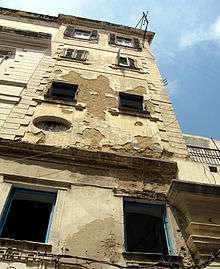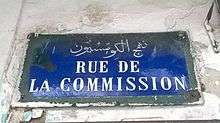Gnecco Palace
Gnecco Palace, also known as Garibaldi palace and Casa de la liberté, is an old palace in the Medina of Tunis.[1]


History
It was built between 1786 and 1866 by Paolo Antonio Gnecco, a rich olive oil and seeds trader.[2]
According to the plaque at the entrance, Giuseppe Garibaldi stayed in the palace during his stay in Tunisia in 1834.[2]
During the 19th century, Giulio Finzi, an Italian lithographer from Livorno, established workshops with lithographic printing machines.[3]
The Franco-Tunisian painter Pierre Boucherle was born in Gnecco Palace on 11 April 1894.[4]
Architecture
Unlike the other palaces of the Medina, this one has the architecture of an Italian palazzo; It has a big portal with columns and an Italian facade with framed windows and pediments.[2]
It has also a courtyard that creates a lighting system for the surrounding rooms.[2]
 Court of Gnecco Palace
Court of Gnecco Palace Facade of the court
Facade of the court Staircase with marble columns
Staircase with marble columns Entrance
Entrance Court
Court Marble column
Marble column
References
- "Festival de la Médina : Tunis raconte ses rues".
- Charles Bilas, Tunis, l'orient de la modernité, Paris, Éditions de l'Éclat, 2010, 319 p. (ISBN 978-2-84162-206-1), p. 102-103
- Feriel Ben Mahmoud et Michèle Brun, Tunisie : un siècle d'images (1857-1956), Paris, Éditions Place des Victoires, 2012, 255 p. (ISBN 978-2-8099-0711-7), p. 59
- France Boucherle, Boucherle : aux origines de l'école de Tunis, Tunis, Cérès, 1997, 150 p. (ISBN 978-9-9731-9333-9), p. 13